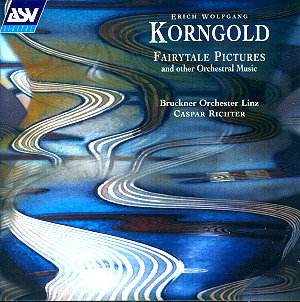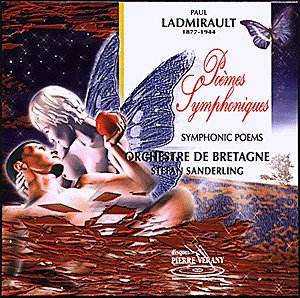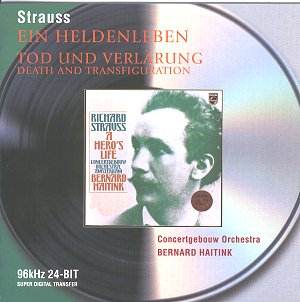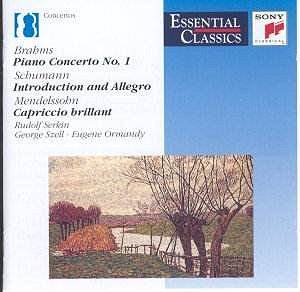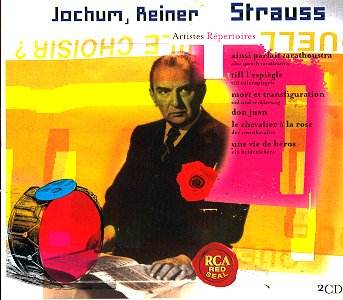 Richard Strauss: Till Eulenspiegel, Der Rosenkavalier Waltz Sequences, Don Juan, Death and Transfiguration, Also Sprach Zarathustra, Ein Heldenleben
Richard Strauss: Till Eulenspiegel, Der Rosenkavalier Waltz Sequences, Don Juan, Death and Transfiguration, Also Sprach Zarathustra, Ein Heldenleben
Rec. Jochum: 1984; Reiner: Death and Transfiguration, 1950; Reiner: Zarathustra and Heldenleben, 1954
RCA Red Seal 74321 846082 [2CDs: 72.42 & 75.35]
Bamberg Symphony Orchestra / Eugen Jochum / RCA Victor Symphony Orchestra / Fritz Reiner
Richard Strauss remains an indelible figure in the landscape of late Romantic music, and this two-CD set presents a compelling survey of his orchestral masterworks as interpreted by two eminent conductors, Eugen Jochum and Fritz Reiner. Each conductor brings a distinctive interpretive lens to Strauss’s complex emotional textures and orchestral color, highlighting their respective strengths and idiosyncrasies.
Fritz Reiner, a titan of the podium, is well-regarded for his authoritative interpretations of Strauss. His 1954 recording of Also Sprach Zarathustra stands as a paragon of clarity and detail. The remastered sound reveals a remarkable depth, enabling the listener to appreciate the intricate interplay between the various orchestral sections. In particular, the opening “Sunrise” is executed with a grandeur that belies its age; the brass section’s powerful proclamations are complemented by a transparent string backdrop. This recording, though captured nearly seventy years ago, showcases an intensity that few modern interpretations can match.
Conversely, Reiner’s 1950 rendition of Death and Transfiguration suffers from sonic limitations that mar its overall impact. While the orchestral playing is commendable, the recording’s congested climaxes obscure the lush textures that Strauss so masterfully orchestrates. The strings, intended to bloom with warmth and richness, instead sound flat and lackluster, presenting an unfortunate barrier to the emotional catharsis inherent in this transformative work. Scholars might argue that the historical context—recorded in an era when technology was still evolving—must be considered, yet it does not fully absolve the performance from its sonic failings.
In contrast, Eugen Jochum’s interpretations with the Bamberg Symphony Orchestra offer a different perspective on Strauss’s oeuvre. While Jochum may not be regarded as primarily a Strauss conductor, his approach to Till Eulenspiegel reveals a nuanced understanding of the characteristically whimsical and satirical elements embedded within the score. Jochum’s slower, more lyrical pacing allows the listener to savor the thematic developments, although it risks sacrificing some of the tension integral to the narrative arc. The Bamberg horns, while not as commanding as their counterparts in Vienna or Berlin, bring a charming color to Don Juan, which, despite its limitations, is imbued with a sense of poetic heroism.
The crowning achievement of Jochum’s contributions to this compilation is undoubtedly his waltz sequences from Der Rosenkavalier, where his sensitivity to orchestral color and flow creates a rich tapestry of sound. The sweeping phrases are executed with a sumptuousness that captures the essence of Strauss’s Viennese milieu. Jochum’s nuanced articulation of the waltz rhythms allows the listener to appreciate the intricacies of Strauss’s orchestration, revealing the work’s inherent charm and romanticism.
The engineering across the recordings is variable, with Jochum’s performances benefitting from a more vivid soundstage that enhances the orchestral interplay. The remastering of Reiner’s Zarathustra is commendable, showcasing the balance between climactic intensity and lyrical passages, yet the earlier Death and Transfiguration recording does not hold up to the same standard, highlighting the disparity in historical recording practices.
In conclusion, this two-CD set serves not only as a reminder of the extraordinary capabilities of Reiner and Jochum but also as a testament to the enduring power of Strauss’s music. While Reiner’s contributions are often overshadowed by the limitations of their era, Jochum’s interpretations invite a fresh perspective on Strauss’s orchestral palette. Each conductor, through their unique interpretive choices, illuminates different facets of Strauss’s rich sound world, making this collection a valuable addition to the library of any discerning listener.
